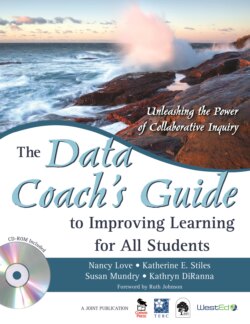Читать книгу The Data Coach's Guide to Improving Learning for All Students - Katherine E. Stiles - Страница 36
На сайте Литреса книга снята с продажи.
Building Leadership and Capacity
ОглавлениеFigure 1.7 Core competencies for high-capacity data use.
First is the focus on building leadership and capacity that Richard Elmore calls for—the first and critical step across the bridge from data to results. By leadership, we mean teachers and administrators with the knowledge and skills to use multiple data sources effectively and collaboratively to improve teaching and learning. The assumption that underlies the essential shift in leadership and capacity is that in a high-performing school, all members of the school community, and especially teachers, act as leaders, impacting the quality of relationships, the school culture, and student learning. When such leadership is widespread and institutionalized, with built-in mechanisms to sustain it, the result is organizational capacity. Michael Fullan (2005) describes capacity building as “developing the collective ability—dispositions, skills, knowledge, motivation, and resources—to act together to bring about positive change” (p. 4). That is what is called for to sustain continuous improvement and what the Using Data Project set out to develop among Data Coaches, who in turn spread this knowledge to others.
If collaborative inquiry were easy, lots of schools would be doing it. It is not. It does not occur magically when data management systems are put in place to provide teachers with timely and accurate data. It does not happen just by giving teachers data and asking them to do something about them. It does not automatically result when schools are organized into professional learning communities and teachers are provided with time to work together. Although time for collaboration and access to timely, accurate data are necessary for collaborative inquiry, much more is required. Effective data users draw on four core competencies, illustrated in Figure 1.7, that are the basis for high-capacity uses of data—those that translate into sustained and significant improvements in instruction and learning and act as the antidote to the abuses of data discussed earlier. They are:
Apply data literacy and collaborative inquiry knowledge and skills to collect, accurately interpret, and analyze multiple data sources and research to identify student-learning problems, verify causes and generate solutions, test hypotheses, and improve results.
Apply content knowledge, generic pedagogical knowledge, and pedagogical content knowledge (how to teach a particular body of content based on understanding of student thinking, key ideas that compose the discipline, and ways of making content accessible to students) to generate uses and responses to data that result in effective interventions and improved teaching and learning.
Apply cultural proficiency (the ability to interact knowledgeably and respectfully with diverse cultures) to view achievement gaps as solvable problems, not inevitable consequences of students’ backgrounds; generate solutions that reflect an understanding of diverse students’ strengths, values, and perspectives; and handle cultural conflict effectively.
Apply leadership and facilitation skills to create high-functioning teams, facilitate productive dialogue focused on teaching and learning, foster commitment to rigorous standards for all students, build collegial relationships based on trust and respect, and sustain collaborative inquiry.
In this book, Data Coaches learn to apply and spread these core competencies as they facilitate the Using Data Process tasks with Data Teams. (For more on developing Data Coach knowledge and skills see the vignette, “Organizing for Collaborative Inquiry—The Data Coach’s Role” in Chapter 2 and Task 5.)
Learning From Experience
Although our program espoused a strong commitment to equity from the outset, we quickly learned that that was not enough. On the second day of our national field test, participants were engaged in dialogue about demographic data. Suddenly, and to our great surprise, conflict erupted in the group between a White participant and an African American participant. The staff was not equipped to handle it. At the same time, we realized that this kind of conflict is not unexpected and, in fact, likely when groups first start talking about race. We were missing an important opportunity if we did not prepare Data Coaches to handle these conversations productively. We were fortunate to have the help of four leading equity experts, who led us to strengthen the program. We added a focus on deepening Data Coaches’ understanding of cultural proficiency and skill building in facilitating dialogue around issues of race, class, culture, gender, and other differences that inevitably arise from examining data. These themes of cultural proficiency are now incorporated throughout the program.
